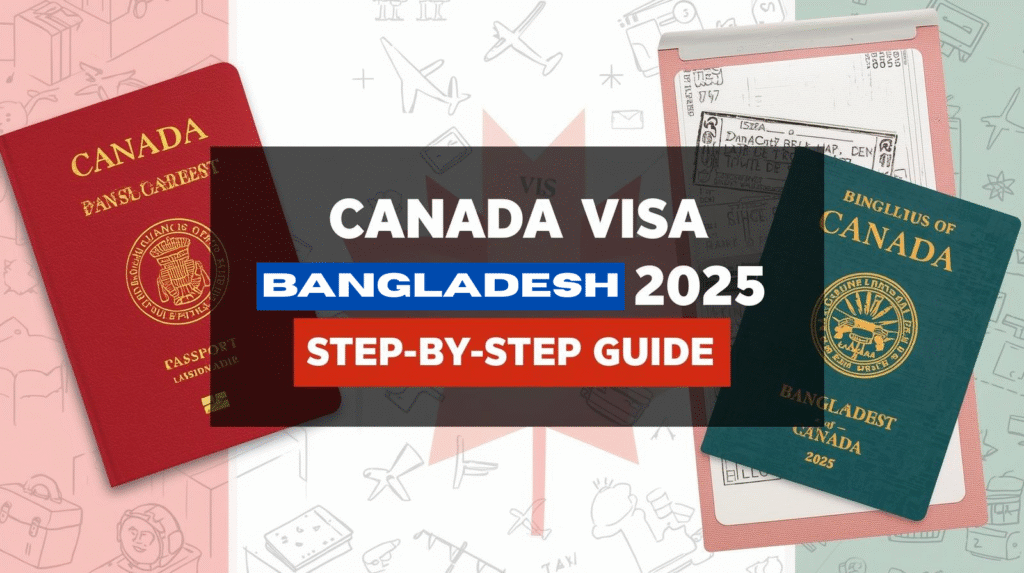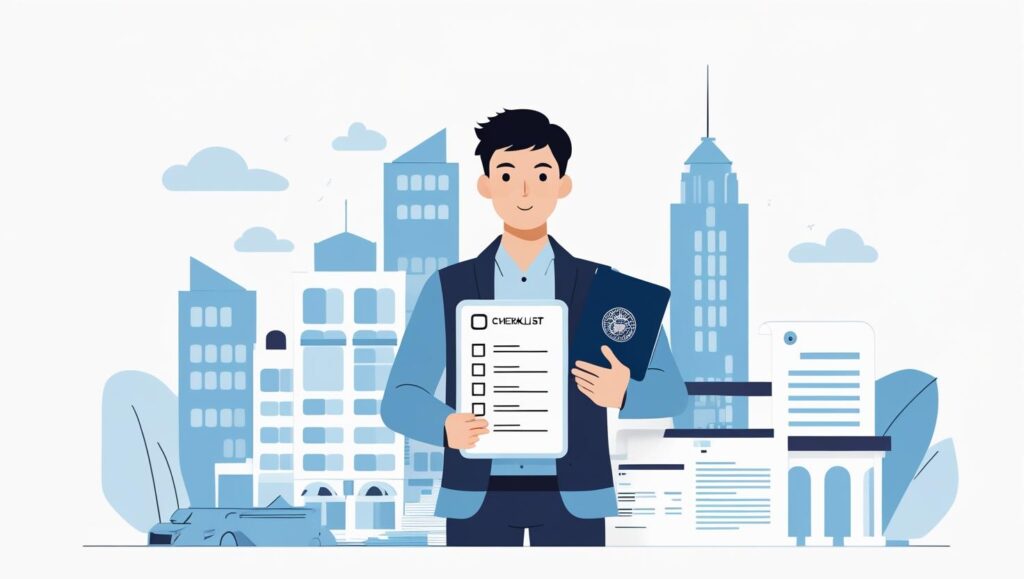Applying for a Canada visa from Bangladesh can feel overwhelming. The official Canadian government website is full of information, but it’s often hard to understand. That’s why we created this easy step-by-step guide.
Here, you’ll learn:
-
The different types of Canadian visas available for Bangladeshi applicants.
-
The step-by-step application process.
-
Required documents, fees, and timelines.
-
Common mistakes people make (and how to avoid them).
-
Practical tips to increase your chances of approval.
By the end, you’ll know exactly how to apply—without confusion or wasted time.
Why Apply for a Canada Visa from Bangladesh?
Canada is one of the top destinations for Bangladeshi students, workers, and tourists. Every year, thousands of Bangladeshis get Canadian visas to:
-
Study at world-class universities.
-
Work in high-paying jobs.
-
Visit family, friends, or explore Canada’s beauty.
-
Migrate permanently through pathways like Express Entry or Provincial Nominee Programs.
But to make your Canadian dream come true, you need the right visa—and the right application strategy.
Types of Canada Visas for Bangladeshi Applicants
Choosing the correct visa is the first step. Below are the most common categories:
| Visa Type | Purpose | Duration | Who Can Apply |
|---|---|---|---|
| Visitor Visa (TRV) | Tourism, family visits, business trips | Up to 6 months | Anyone with strong ties to Bangladesh |
| Study Permit | Study at a Canadian institution | Duration of course + 90 days | Students accepted by Canadian schools |
| Work Permit | Temporary jobs in Canada | Varies (LMIA/Job offer required) | Skilled/semi-skilled workers |
| Express Entry (PR) | Permanent residency through skilled immigration | Permanent | Skilled workers meeting CRS requirements |
| Provincial Nominee Program (PNP) | Permanent residency via provinces | Permanent | Applicants targeted by provinces |
| Family Sponsorship | Join family members in Canada | Permanent | If you have a Canadian PR or citizen relative |
Step-by-Step Process to Apply for a Canada Visa from Bangladesh
1. Choose the Right Visa
Decide whether you need a visitor visa, study permit, work permit, or PR. Choosing the wrong one can cause rejection.
👉 Pro Tip: If you’re a student, always apply with proof of funding and tuition payment. If you’re applying for a visitor visa, show strong ties to Bangladesh (job, property, family).
2. Check Eligibility
Go to the official IRCC website and use their visa wizard tool. It will confirm if you’re eligible.
Key factors:
-
Valid passport.
-
Clean travel history (if any).
-
No serious medical or criminal issues.
-
Proof of financial stability.
3. Gather Required Documents
Documents vary by visa type, but generally include:
-
Valid Bangladeshi passport.
-
Passport-sized photos (as per Canadian standards).
-
Completed visa application forms.
-
Proof of funds (bank statements, salary slips).
-
Acceptance letter (for students).
-
Job offer/LMIA (for workers).
-
Travel itinerary and purpose of visit (for visitors).
👉 Pro Tip: Translate documents into English/French if needed, and get them certified.
4. Apply Online or Via VFS Global
Most applications are now online through the IRCC portal.
For biometrics and paper submissions, you’ll go through VFS Global Bangladesh (Dhaka).
Steps:
-
Create an IRCC account.
-
Fill out the application form.
-
Upload documents.
-
Pay the visa fee online.
-
Book biometrics appointment at VFS Dhaka.
5. Pay Visa Fees
Here’s an estimate of common fees (2025):
| Visa Type | Application Fee | Biometrics Fee | Total |
|---|---|---|---|
| Visitor Visa | CAD $100 | CAD $85 | CAD $185 |
| Study Permit | CAD $150 | CAD $85 | CAD $235 |
| Work Permit | CAD $155 | CAD $85 | CAD $240 |
| PR (Express Entry) | CAD $850 + Right of PR $575 | CAD $85 | CAD $1,510 |
👉 Pro Tip: Always keep digital and printed copies of your payment receipt.
6. Give Biometrics
You must give fingerprints and a photo at the VFS office in Dhaka. Without biometrics, your application won’t move forward.
7. Wait for Processing
Processing times vary:
-
Visitor Visa: 4–8 weeks.
-
Study Permit: 8–12 weeks.
-
Work Permit: 12–16 weeks.
-
PR Applications: 6 months+ (Express Entry).
👉 Check current processing times on the IRCC website.
8. Medical Exam (if required)
For study, work, or PR visas, you may need a medical exam from an IRCC-approved panel physician in Dhaka.
9. Visa Decision
You’ll receive an update in your IRCC account or email. If approved, your passport will get the Canadian visa stamp.
If refused, you’ll get a letter explaining why.
Common Reasons for Rejection (and How to Avoid Them)
❌ Weak financial proof → ✅ Show strong bank balance, job letter, or sponsorship.
❌ Missing documents → ✅ Double-check checklist before submission.
❌ Weak travel history → ✅ Be honest, provide strong ties to Bangladesh.
❌ Wrong visa category → ✅ Apply for the correct visa type.
FAQs – Canada Visa from Bangladesh
1. How long does it take to get a Canada visa from Bangladesh?
It depends on the visa type. On average, visitor visas take 1–2 months, while study permits may take up to 3 months. PR applications can take 6–12 months.
2. Can I apply for a Canada visa without IELTS?
Yes, visitor visas don’t require IELTS. But for study or PR visas, English proficiency (IELTS/TOEFL) is usually mandatory.
3. Where do I give biometrics in Bangladesh?
At the VFS Global Canada Visa Application Centre in Dhaka.
4. Can I work in Canada with a visitor visa?
No. You need a valid work permit to legally work in Canada.
5. What is the Canada visa success rate from Bangladesh?
It depends on the visa type and your profile. Strong applications (clear purpose, funds, and ties) have higher success rates.
Final Thoughts
Applying for a Canada visa from Bangladesh doesn’t have to be confusing. With the right documents, careful preparation, and honest application, your chances of approval increase significantly.
If you’re ready to start your journey, check out:
-
Our detailed guides on study permits, work visas, and PR pathways.
✨ Pro Tip: Start your application early and prepare extra proof of funds—it makes a big difference.




Pingback: Best Canadian Cities to Live in 2025: Pros, Cons & Costs Canadian Life Hub